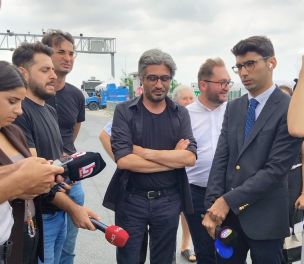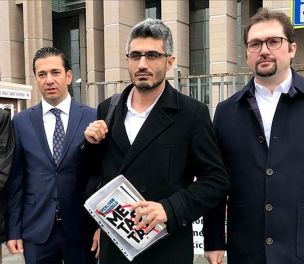Click to read the article in Turkish
The police officer who battered journalist Barış Pehlivan in prison in March 2020 has been issued a warning by the prison administration.
Pehlivan was sent to İstanbul's Silivri Prison after a court remanded him in custody because of a news report about the killing of an intelligence officer in Libya.
The Silivri Public Prosecutor's Office previously decided not to prosecute prison officer Muhammed B. despite surfaced footage showing the incident.
CLICK - Footage reveals journalist Barış Pehlivan beaten by prison officer
Hüseyin Ersöz, the attorney of Barış Pehlivan, said that the prosecutor's office did not carry out an effective investigation and that the Ministry of Justice inspectors presented an opinion that the suspect should be reprimanded.
"But the Silivri Prison administration implemented a 'warning' fine on the grounds of the suspect's good behavior in the past," he said.
The report by the ministry inspectors says that the suspect's claim that the plaintiff was angry and aggressive could not be confirmed by camera recordings and witnesses.
"Even if the arrestee acted angry and aggressive, the obligation of the correction officer is to respond to the arrestee with an appropriate attitude and language and his behavior aimed at intimidating his interlocutor, putting him under pressure making him uneasy with a harsh and aggressive attitude does not comply with the basic principle that he cannot demonstrate degrading and humiliating behavior during the execution of penal and security measures," the inspectors said and gave their opinion for penal action to be taken against the suspect.
"There should be a much heavier punishment"
Noting that institutions normally implement the opinions of inspectors, attorney Ersöz noted said the prison administration's approach was unacceptable.
"Because this situation shows us only the aspect that is made public in the case of Barış Pehlivan," he said. "It prevents examination and evaluation of whether similar incidents and situations occur in the prison."
"The beating of Barış Pehlivan shouldn't be regarded as an individual case. Although the prison exercised its discretion for a 'warning' fine to be given to the suspected officer, it is not possible for us to accept the reduction in punishment, considering the complaint was made for 'battery.' There should have been a much heavier punishment.
"Moreover, it is very difficult to guess what kind of reactions a person who has such aggressive behaviors and can't be calm according to the camera footage shown in the media would show in the face of other incidents. It should be sensitively examined whether there are other cases like the beating of Barış Pehlivan.
"What happened in Silivri Prison was not just the beating of Barış Pehlivan. Also, some information such as with whom the attorneys who went to the prison met and who visited Barış Pehlivan was leaked to the press. The leak of this information, which should be confidential because of being personal data, is against the Law on the Protection of Personal Data.
"We have conveyed our complaints regarding the leak of the information to both the Ministry of Justice and to the Silivri Public Prosecutor's Office. The proceedings are underway."
Attorneys also made an application to the penal judgeship of peace, considering the warning issued to the officer as new evidence.
RSF representative Önderoğlu: It's worrying
Erol Önderoğlu, the Turkey representative of the Reporters Without Borders (RSF) and the BİA Media Monitoring rapporteur, said that the incident would have been recorded as a "slander against the prison administration" if the ministry report wasn't prepared.
It was worrying that the officer was only warned, he said, adding, "There is widespread impunity regarding violence against journalists in Turkey."
He noted that the Constitutional Court found rights violations in the cases where journalists Erdal İmrek and Beyza Kural were subjected to violence. "But what difference does it make in an environment where public authorities don't tolerate journalists?"
"In the last five years, 139 media representatives were subjected to violence while they were on duty.
Unfortunately, we see that the cases where there is a complaint about violence are not taken seriously until they were brought to the Constitutional Court and the European Court of Human Rights. Prosecutors don't want to take action, they act in a cursory way. (HA/VK)









